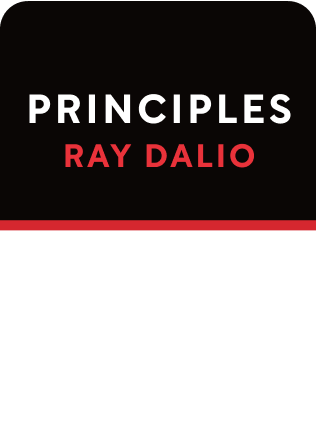

This article is an excerpt from the Shortform summary of "Principles: Life and Work" by Ray Dalio. Shortform has the world's best summaries of books you should be reading.
Like this article? Sign up for a free trial here .
Do you want to know how to deal with different personalities at work? Can a different personality make it challenging to work in teams?
Learning how to deal with different personalities at work can help you learn how to succeed in a team environment, and how to better collaborate with others.
Keep reading to learn how to deal with different personalities at work.
How to Deal With Different Personalities at Work
A key part of working with others is figuring out how you all behave and think differently. And knowing how to deal with different personalities at work can lead to great results.
Through a combination of genetics and environment, people come to think in very different ways. People who think very differently have trouble understanding each other and often ignore the value of what they don’t have. Here are a few examples:
- Abstract thinkers think literal people have no imagination. Literal people think abstract people are pedantic philosophers.
- Extroverted people love talking out ideas. Introverts prefer thinking privately and sharing after they’ve grappled with a problem. They often misunderstand each others’ intentions in meetings—extroverts can think introverts are unopinionated and passive; introverts may think extroverts are loudmouths and ramble too much.
- Planners like sticking to a plan, but they can be seen as rigid and slow to adapt. Perceivers change direction often based on new information, but they can be seen as impulsive and unpredictable.
It’s hard enough to know what type of person everyone else is. Compounding this problem, people often don’t know which type of person they are themselves. This leads to all sorts of misunderstandings and conflicts.
Figuring Out People Types
To learn how other people think and behave, you need to adopt the right mindset. Be curious: you should want to understand how people who see things differently came to see them that way. Instead of getting frustrated with people and the choices they make, realize they aren’t intentionally acting in a counterproductive way—they’re simply making the best decisions they can based on how their brains work. If you had exactly the same brain and the same set of experiences as the other person, you would probably believe in the same things and behave the same way.
Next, understand the strengths and weaknesses of yourself and other people to get the best results out of everyone. People with complementary strengths do better work together than separately. For example, a visionary and an executor can accomplish more together than each can individually.
- Managers who don’t understand people’s thinking styles won’t understand how their team will behave in different situations. This is like a construction foreman not understanding how his equipment works.
- Instead, see yourself as the conductor of an orchestra. You bring in people at the right moments and in the right balance to execute your vision.
How do you actually figure out people’s personality types? Ray Dalio is a big fan of personality assessments. Here are the assessments he mentions in Principles:
- Myers-Briggs Type Indicator
- This assesses a person’s position along four axes: Introversion/Extraversion, Sensing/Intuition, Thinking/Feeling, and Judging/Perception.
- Big Five
- This assesses a person’s position along five factors: Openness to experience, Conscientiousness, Extraversion, Agreeableness, and Neuroticism.
- Workplace Personality Inventory
- This assesses traits of persistence, independence, stress tolerance, analytical thinking, achievement orientation, and concern for others.
- Team Dimensions Profile
- This categorizes people into different profiles: creators, refiners, advancers, executors, and flexors.
- Stratified Systems Theory
- This studies the level of complexity at which people perform best. Some work best in transactional roles, focusing on executing daily items and acting in the present. Others work best on high-level strategy over long time horizons and deal with high uncertainty. Others work best in between at a supervisory level, developing the plans that the transactional levels execute.
Understanding People With Their Types
Taking the results of a person’s personality assessment, you could then combine traits to form an archetype about the person. This might include the head-in-the-clouds Visionary, the impractical Artist, the tidy Perfectionist, the Wise Judge, the reliable Bedrock, and so on. But do you actually know how do deal with different personalities in life? And what does it take to learn how to deal with different personalities at work?
Ray Dalio takes archetypes a step further with his baseball cards tool, which describes at a glance how a person thinks and behaves. Each baseball card assigns attributes like “conceptual,” “creative,” and “determined.” It also assigns tendencies for behavior, like “holds others accountable” and “pushes through to results.”
Combined with the person’s archetype and personality assessment, the baseball card gives a clear narrative of how the person will behave, and how they fit into a team. For example, a person might have a Myers-Briggs type of S (for Sensing, meaning more concerned with concrete details) and a J (for Judging, meaning more structured and orderly). She might also have an “executor” archetype. It’s then clear what this person is best suited for—conscientious execution of detailed plans.
Once you understand yourself and other people to this level of detail, you can form a dream team of people with complementary strengths. (Shortform note: Dalio does not go so far as to describe the ideal composition of a team, or how different people of different types should work with each other. This level of detail might have been out of scope of this book.)
Characteristics of Shapers
In the book, Dalio describes in detail one particular archetype that he believes he fits into: the “shaper.” The shaper comes up with unique and valuable visions and builds them out, despite the doubts of others. You’ll need to know about shapers to know how to deal with different personalities at work.
Dalio realized his archetype when he was transitioning out of his CEO role, and he asked his lieutenants what his unique skill was. They answered it was “shaping.” He also believes other founder-entrepreneurs like Steve Jobs, Jeff Bezos, and Elon Musk fit this archetype. You may not be surprised to learn that learning how to deal with this type of personality can also help you deal with different personalities in life, especially strong personalities.
Shapers have these qualities in common:
- Their baseball card reads: Visionary + Practical Thinker + Determined
- They are independent thinkers verging on rebelliousness.
- They don’t let anything stand in the way of achieving their goals.
- They are resilient and gritty. Their need to achieve is stronger than the pain they experience.
- They have strong mental maps of how things should be done.
- They test their mental maps and change them to make them work better.
- They have a wider range of vision than most, seeing both big picture and granular details.
- They are assertive and open-minded at the same time. They are creative, systematic, and practical at the same time.
- They are intolerant of people who work for them who aren’t excellent.
- Nothing ever feels good enough, and this gap is both a tragedy and a constant source of motivation.
- They generally have low ranking on “concern for others”—largely because when faced between achieving their goal and pleasing others, they choose their goal every time.
- They sustain success over decades with continuous innovations and successes, rather than selling their company once for a lot of money (Dalio calls these “inventors”) or entering existing organizations and leading them well.
So are some personalities better than others? And how do you deal with different personalities at work? Dalio doesn’t have any value judgment on whether shapers are more important or valuable than other types. He just classifies himself as one and believes other founders of large companies tend to be them too. And of course, knowing how to deal with different personalities at work can help you learn how to deal with different personalities in life—all in all, making you a more cooperative person.

———End of Preview———
Like what you just read? Read the rest of the world's best summary of Ray Dalio's "Principles: Life and Work" at Shortform .
Here's what you'll find in our full Principles: Life and Work summary :
- How Ray Dalio lost it all on bad bets, then rebounded to build the world's largest hedge fund
- The 5-step process to getting anything you want out of life
- Why getting the best results means being relentlessly honest with everyone you work with






